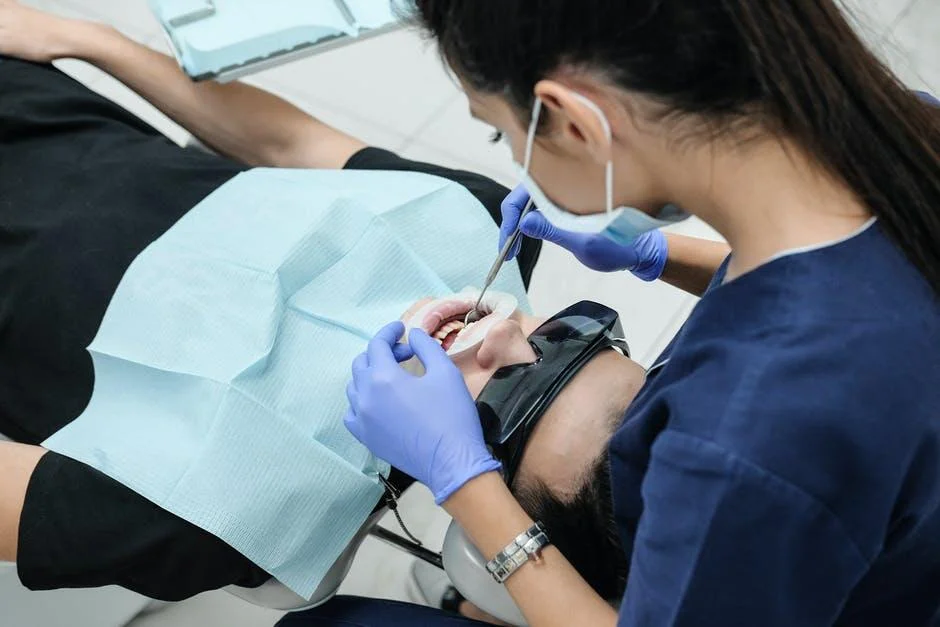Health
The Importance of Seeking Emergency Wisdom Tooth Removal and Preventing Complications

Dealing with wisdom tooth pain can be unbearable. Ignoring it can lead to severe complications. That’s why emergency wisdom tooth removal is crucial.
It prevents infections, reduces pain, and protects your oral health. Don’t wait until the pain becomes unmanageable. Act quickly to avoid further issues.
Emergency wisdom tooth removal is a quick and effective solution. Ensure your peace of mind and overall well-being. Let’s discuss the importance of seeking emergency services like wisdom, tooth extraction and how it aids in preventing future dental complexities.
Preventing Infection
An impacted wisdom tooth can create pockets in the gums where bacteria can thrive. This can lead to painful infections such as pericoronitis. This can spread to other areas of the mouth and even the bloodstream.
Visit your dentist at least twice a year for check-ups. They can spot early signs of a wisdom tooth cavity and provide treatment. Regular cleaning helps prevent infections and other dental issues.
If you feel pain near your wisdom teeth, see a dentist quickly. Early treatment can stop a cavity from getting worse. Avoiding sugary snacks also helps.
Using an antimicrobial mouthwash can reduce bacteria. This decreases the chance of infection. Combine this with other good oral hygiene practices for the best results.
Avoid Damage to Adjacent Teeth
A broken wisdom tooth can cause many issues. One major problem is damage to the teeth next to it. If the wisdom tooth breaks, it might push against other teeth. This pressure can make nearby teeth crooked.
Cleaning around a broken wisdom tooth is hard. Food particles and bacteria can get trapped. This can lead to decay in the neighboring teeth. Regular dental visits help address these risks early.
Using proper brushing and flossing techniques is vital. Pay special attention to the back of your mouth. This area is where wisdom teeth usually are. It can help in maintaining better oral health.
A dentist may suggest removing the broken wisdom tooth. This prevents it from harming other teeth. Timely removal can save you from more dental problems.
Alleviating Severe Pain
Severe wisdom tooth pain can be overwhelming. Painkillers may provide temporary relief but aren’t a permanent solution. It’s essential to address the root cause of the pain.
If you experience unbearable pain, visit an emergency dentist. They can assess the situation and recommend immediate action. This step is crucial in preventing further complications.
Applying a cold compress can help reduce swelling and numb the area. Avoid hard or crunchy foods that might aggravate the pain. Soft and cooling foods like yogurt can be soothing.
Proper oral hygiene is vital during this time. Gently brushing and flossing can remove trapped food particles. Rinsing with warm salt water can also help reduce inflammation.
Reducing the Risk of Cysts and Tumors
Wisdom teeth can sometimes cause cysts in the jawbone. These cysts can damage the bones and nearby teeth. Early removal of wisdom teeth reduces this risk.
Tumors can also develop around impacted wisdom teeth. Though rare, they are serious. Removing wisdom teeth early can help prevent this from happening.
Regular dental check-ups are crucial. Dentists can spot early signs of cysts or tumors. Prompt action can save you from complicated treatments later.
Good oral hygiene also plays a part. Proper brushing and flossing can prevent infections. Healthy gums lower the risk of cysts and tumors forming.
Avoiding Sinus Problems
Sinus problems can arise from impacted wisdom teeth. These issues can cause headaches and sinus pressure. It’s important to address wisdom tooth issues early.
Visit your dentist regularly for check-ups. They can spot problems that may affect your sinuses. Early treatment prevents complications.
Avoid smoking as it can worsen sinus issues. Smoking irritates the sinus lining and can cause more pain. Staying smoke-free helps your overall health.
Maintain good oral hygiene to prevent sinus problems. Brush and floss daily to keep your mouth clean. Regular cleanings also help reduce risk.
Preventing Crowding
Wisdom teeth can cause overcrowding in your mouth. When wisdom teeth come in, they often do not have enough space. This makes them push against other teeth.
Overcrowding can make your teeth look crooked. It can also cause pain and discomfort. Regular dental check-ups can catch this issue early.
Your dentist might suggest removing wisdom teeth. This can stop other teeth from shifting. Removing them can keep your smile straight and healthy.
Braces and retainers can fix crowding too. These treatments adjust the position of your teeth. Always follow your dentist’s advice for the best results.
Reducing Swelling and Inflammation
An impacted wisdom tooth can cause significant swelling and inflammation in the gums. This can be painful and make it difficult to open your mouth or chew. Emergency extraction can reduce this inflammation, improving your ability to eat and speak comfortably.
Anti-inflammatory medications can help reduce swelling. Over-the-counter drugs like ibuprofen are commonly used. Follow the instructions on the label to avoid side effects.
Rinsing your mouth with salt water can also help. Mix a teaspoon of salt with warm water and swish it around. This can reduce bacteria and soothe inflamed gums.
Avoid hot or spicy foods if your mouth is swollen. These foods can irritate your gums even more. Stick to soft, cold foods until the swelling goes down.
Preventing Gum Disease
Wisdom teeth often emerge partially or misaligned causing difficulties while brushing and flossing leading to bacterial growth and eventually gum disease. Timely removal is key to maintaining overall oral health and preventing further complications like periodontitis.
Regular dental visits also play a significant role in preventing gum disease. Dentists can assess the condition of your wisdom teeth and provide necessary treatments or recommendations.
Good oral hygiene is essential in preventing gum disease. Make sure to brush twice a day, floss daily, and use an antimicrobial mouthwash to reduce bacteria in your mouth.
The Vital Role of Emergency Wisdom Tooth Removal
Emergency wisdom tooth removal is essential for preventing a host of dental issues, from infections to severe pain and even cysts and tumors. Addressing wisdom tooth problems promptly ensures better oral health and overall well-being.
Don’t delay seeking treatment; early intervention can save you from more complicated and painful procedures in the future. Always consult your dentist if you experience symptoms that may require emergency wisdom tooth removal.
For more information and advice on oral health, check out the rest of our blog.
Health
Understanding the Symptoms and Treatment of Whiplash Injury

Ever wondered what happens to your body after a sudden jolt from a car accident?
Whiplash injury is a common result of such events and can cause many problems that make everyday life difficult. Symptoms include neck pain, headaches, dizziness, and feeling tired. Knowing these signs early helps in getting the right treatment.
Options like physical therapy, medication, and home care can help you recover faster and reduce long-term pain.
Read this guide to learn how to recognize and treat whiplash injuries effectively.
Neck Pain and Stiffness
Neck pain and stiffness are common after a whiplash injury, especially from a car accident injury. This happens when the head is quickly thrown back and forth, hurting the neck muscles and ligaments.
Pain and stiffness can start within hours or days after the accident, making it hard to move the neck without pain. Treatment includes rest, gentle exercises, and pain medications to help you feel better and move your neck again.
Knowing these treatments can help you recover and learn about common neck injuries from car accidents.
Headaches
Headaches are a common symptom of whiplash injury, often resulting from an auto injury. They usually start at the base of the skull and can spread to other areas of the head. These headaches may begin soon after the accident or take a few days to appear.
They can be sharp, throbbing, or constant, making it hard to focus on daily tasks. Treatment options include rest, pain relief medications, and gentle exercises to ease the tension.
Sometimes, seeing a doctor or a physical therapist can also help manage the pain and speed up recovery. Understanding these options can guide you through healing and help you cope with headaches caused by whiplash injuries.
Dizziness
Dizziness is a common symptom of whiplash injury, often caused by an auto injury. This feeling can make you feel unsteady or lightheaded, affecting your balance. It might start right after the accident or take some time to appear.
Dizziness can be scary and make it hard to do everyday tasks like standing up or walking. Treatment includes rest, drinking plenty of fluids, and doing gentle head movements to help regain balance.
Sometimes, doctors suggest physical therapy to improve stability. Talking to a healthcare professional can give you a clear plan to manage dizziness. Knowing these options can help you recover from whiplash injuries and feel better.
Fatigue
Fatigue is a common symptom of whiplash injury, often making you feel extremely tired and lacking energy. This exhaustion can affect your ability to carry out daily activities and may last for days or even weeks after the injury.
Rest is crucial in managing fatigue, allowing your body the time it needs to heal. Staying hydrated and maintaining a balanced diet can also help boost your energy levels.
Gentle exercises and physical therapy might be recommended to gradually restore your strength. Seeing a doctor can provide more personalized advice and treatment options.
Understanding these methods can help you manage fatigue from whiplash injuries and support your recovery.
Conquering Whiplash Injury and Your Journey Forward
Getting better from a whiplash injury takes time and care. Knowing the symptoms like dizziness and feeling very tired helps you find ways to deal with them. Seeing a doctor will give you the right advice and treatment.
Simple exercises, drinking enough water, and eating well can help your body heal. Every small improvement counts. With patience and support, you can overcome whiplash injury and get back stronger.
Did you find this article helpful? You can check out our website for more awesome content like this.
Health
Dental Facings vs. Veneers: What’s the Difference?

Have you ever wondered about the best way to enhance your smile?
Many people consider dental facings and veneers when looking to brighten their teeth. Both options can transform your appearance, but they are different in many ways.
Understanding these differences can help you make the right choice. Keep reading to discover which option might be the best fit for your smile needs.
Understanding Dental Facings
Dental facings are thin layers that cover the front of your teeth to improve their look. They can help fix small chips, gaps, or stains, making your smile brighter and more attractive. Below, we’ll explore what dental facings are, how they work, and the benefits they offer.
What Are Dental Facings?
Dental facings are made from materials like porcelain or composite resin. They are custom-made for each patient to fit perfectly over the teeth.
By adding these thin layers, facings can make teeth look whiter and smoother. They are especially good for hiding small problems such as stains or unevenness. They can give you a bright and even smile that boosts your confidence.
Benefits of Dental Facings
Dental facings can greatly improve the appearance of your teeth. They are effective at covering up stains, chips, and gaps, making your smile look fresh and clean.
Additionally, they are less invasive than other options. They require minimal shaping of the original tooth.
With proper care, dental facings can last for many years. They provide a beautiful smile that boosts your self-esteem and confidence in social situations.
When to Choose Facings
You might consider dental facings if you have minor imperfections in your teeth, such as small chips or discoloration. They are a great option for people who want a smile makeover without extensive procedures.
If you want to enhance your smile for special events or everyday confidence, facings can provide a quick and effective solution. It is a great alternative to a full-mouth reconstruction. Discussing your needs with a dentist will help determine if facings are right for you.
Exploring Veneers
Veneers are another popular option for enhancing smiles. They are thin shells usually made of porcelain that cover the front surface of your teeth. Unlike dental facings, veneers are for more significant cosmetic issues.
What Are Veneers?
Veneers are thin, custom-made shells that fit over the front of your teeth. They are mostly made from porcelain, which looks like natural teeth. Veneers help fix more serious dental problems, such as bigger chips, cracks, or severe discoloration.
They can change the shape, size, or color of your teeth, creating a smooth and even smile that many people desire. Veneers are often chosen for a complete smile makeover.
Types of Veneers Available
There are several types of veneers available to suit different needs. The most common type is porcelain veneers, which are strong and mimic the look of natural teeth.
Composite veneers are another option. They’re made from a tooth-colored resin and can be applied in one visit.
Finally, there are pre-made veneers that are more affordable and quick to deliver. Keep in mind though that they may not fit as perfectly as custom options.
Veneer Advantages and Disadvantages
Veneers have several advantages. They can improve the appearance of your teeth, making them whiter and more uniform. They also resist stains better than natural teeth.
However, there are some drawbacks. The process of placing veneers can be expensive, and once applied, they cannot be removed. Additionally, some people may need to have a small amount of their tooth enamel removed to make space for the veneer.
Application Process
Understanding the application of dental facings and veneers can help you feel more confident about your choice. The process can vary depending on the type of enhancement you choose.
Below, we’ll talk about the steps involved in applying both dental facings and veneers. With this, you’ll know what to expect during your visit to the dentist.
How Facings Are Applied
Applying dental facings is a straightforward process. First, the dentist will clean your teeth and may remove a little enamel to help the facings stick better. Then, they take impressions of your teeth to create custom facings.
Once ready, the dentist will carefully place the facings on your teeth using a special adhesive. Finally, they will check the fit and appearance. They’ll be making adjustments if needed before polishing them for a perfect shine.
Veneer Application Steps
The process of getting veneers usually takes two visits to the dentist. During the first visit, the dentist will clean your teeth and remove a small amount of enamel to make space for the veneers. They will then take impressions of your teeth to create custom veneers.
During the second visit, the dentist will place the veneers on your teeth with a special glue. This ensures that they look natural and feel comfortable.
Preparation and Aftercare
Getting dental facings or veneers requires some steps to prepare and care for them properly. Before the procedure, your dentist will check your teeth and discuss the best option for you.
After placement, it is important to keep your teeth clean. You should also avoid hard foods that could damage the facings or veneers. Regular dental check-ups will also help maintain your new smile and ensure everything stays in good shape.
Cost Comparison
When considering dental facings and veneers, it’s crucial to understand the costs involved. Prices can vary based on factors like the materials used and the complexity of the procedure.
Below, we’ll compare the costs of dental facings and veneers. With this, you can make an informed decision about which option fits your budget.
Cost of Dental Facings
The cost of dental facings can vary depending on where you go and the materials used. On average, you might pay between $200 and $1,000 for each tooth.
This price usually includes the dentist’s work and the materials needed to make your custom facings. It is important to ask your dentist for a detailed estimate before starting the procedure, so you know what to expect.
Veneer Cost Overview
The cost of veneers usually ranges from $500 to $2,500 for each tooth. This range depends on the type of veneer you choose and where you get the treatment.
Porcelain veneers are often more expensive but last longer and look more natural. Composite veneers are cheaper but may not be as strong.
Always ask your dentist for a clear estimate for these cosmetic dental solutions. By doing so, you’ll understand the total cost before starting the procedure.
Factors Affecting Price
Several factors can affect the price of dental facings and veneers. The type of material used plays a big role in cost, with porcelain usually being more expensive than composite materials.
The dentist’s experience and location also matter. Prices can vary based on where you go for treatment.
Additionally, the complexity of your case might influence the final price. With these factors in mind, it’s important to discuss all details with your dentist.
Making the Right Choice
Choosing between dental facings and veneers can be a big decision. Both options can improve your smile, but each has unique features and benefits. By understanding your options, you’ll feel more confident in deciding which one best suits your needs.
Which Is Better for You?
Deciding between dental facings and veneers depends on your needs and problems with your teeth. If you have small chips or stains, dental facings may be a better fit. They are less costly and need less work on your teeth.
However, if you have bigger issues, such as larger chips or severe discoloration, veneers might be the better choice. Discuss your goals and concerns with your dentist to find the right option for achieving your perfect smile.
Factors to Consider
When choosing between dental facings and veneers, consider your dental issues and preferences. It’s also important to keep your budget in mind. Consider how visible the issues are and how much change you want in your smile.
Talk to your dentist about your goals and what each option offers. Remember to ask about the cost, care needed, and how long each solution will last. By understanding these factors, you can make a better choice for your smile.
Consulting With a Dentist
Before choosing between dental facings and veneers, it’s important to talk to a dentist. They will look at your teeth and listen to your concerns.
The dentist can help you understand your options and guide you on what might work best for your needs. They will explain the steps involved, the costs, and how long the results can last. With their help, you can make a confident decision for a brighter smile.
Dental Facings and Veneers: Choose the Right One for You
When deciding between dental facings and veneers, it’s essential to understand your needs. Be sure to consider your preferences as well. Both options can improve your smile, but they work in different ways.
By consulting with a dentist, you can learn more about how dental facings might help you achieve the look you want. Remember to consider your budget and the care required for each option. A beautiful smile is within your reach!
Are you looking for other helpful content? If so, stay with us and continue reading for more.
Health
Frequently Asked Questions About Braces for Teens

Braces can feel a bit daunting for many teens, but they’re a common part of the journey to a beautiful smile. It’s natural to have questions about how they work, what to expect, and how to take care of them.
Whether it’s about the different types of braces, the cost, or the timeline for treatment, it’s important to get the right answers. Here are some frequently asked questions about braces for teens!
Why Might a Teen Need Braces?
Teens might need braces for several reasons. One common reason is to correct crooked teeth, which can affect their smile and confidence. Braces can also help with gaps between teeth, overcrowded mouths, or bite issues like overbite or underbite.
These problems can make it hard to chew food or speak clearly. Overall, orthodontic treatment helps create a healthy and straight smile, giving teens the confidence they need during this important stage of their lives.
What Are the Different Types of Braces?
Braces come in several types to meet different needs and preferences. Traditional metal braces use stainless steel brackets and wires, making them strong and effective for most cases. Ceramic braces are less visible as they match the color of the teeth, which can make them a popular choice for teens.
For a more discreet option, clear aligners can be used, and they are removable, which makes eating and cleaning easier. It’s best to consult with board certified orthodontists to determine the right option for each individual.
How Long Will I Need to Wear Braces?
The length of time a teen needs to wear braces can vary. On average, most people will have braces on for about 18 to 24 months. However, some may need them for a shorter or longer period, depending on their specific dental care needs.
Factors that influence the duration include the type of braces used, the severity of the dental issues, and how well the teen follows their orthodontist’s instructions. Regular check-ups are important to ensure the treatment stays on track and to make adjustments as needed.
Will Braces Hurt?
Getting braces may cause some discomfort at first. You might feel pressure on your teeth, which is normal as they shift into place. When the braces are adjusted during check-ups, you may experience mild soreness for a few days. However, this feeling usually goes away quickly.
Over-the-counter pain relievers can help if you’re feeling uncomfortable. Eating soft foods and rinsing with warm salt water can also make things easier while you adjust to wearing braces. Remember, any pain is temporary, and many teens find that their smiles are worth it!
Learn All About Braces for Teens
In summary, braces for teens play a pivotal role in guiding them towards achieving an aesthetically pleasing and functional smile. While the journey with braces can present its challenges, the end result is often rewarding, leading to enhanced self-esteem and improved oral health.
As teens embark on this orthodontic adventure, it’s essential to remain informed and proactive, ensuring a smooth process from start to finish.

 Business3 months ago
Business3 months agoTex9.Net Crypto: Fast, Secure International Money Transfers with Competitive Rates

 Entertainment2 months ago
Entertainment2 months agoSandra Orlow: Exploring the Life and Legacy of a Cultural Icon

 General1 week ago
General1 week agoBaby Alien Fan Bus: Watch Parts 2 & 3 on Twitter, Reddit!

 General1 week ago
General1 week agoDiana Nyad & Bart Springtime: A Swim to Success

 Business3 months ago
Business3 months agoSnapchat Planets: Exploring Your Streak Universe

 General1 month ago
General1 month agoDeeper Dive into myfavouriteplaces. org:// blog

 Business3 months ago
Business3 months agoFintechZoom Apple Stock: Real-Time Insights and Expert Analysis

 Entertainment3 months ago
Entertainment3 months agoUnlock Your Fantasy: Dive into Coomer Party Free OnlyFans Leaks!
















